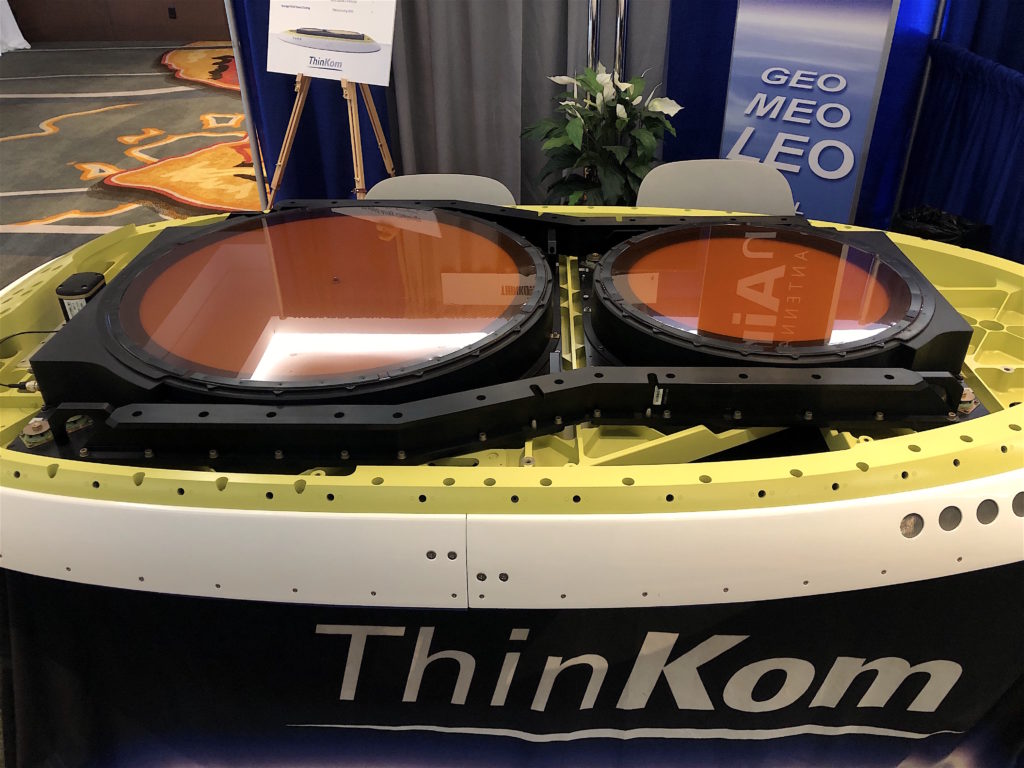
The antenna ThinKom supplies for Gogo’s 2Ku system, on display at its 2019 Global Connected Aircraft Summit booth. Due to the COVID-19 pandemic, the 2020 Global Connected Aircraft Summit is postponed until June 2021, however, the 2020 online “Cabin Chats” will occur in its place, June 22-26, 2020, with 1-1.5 hour presentations, panels, roundtables and networking each day.
Next week, we bring you another virtual event as we look at one of the more impacted and interesting markets in this area – connected aviation. Our Global Connected Aircraft Summit (GCAS) has been going for seven years and has offered a unique platform for airlines, business jet operators, satellite players, as well as solutions providers, opportunities to network and talk about the connected aircraft of the future. This year’s show was meant to take place in Denver, Colorado, but sadly had to be postponed until June next year due to the Coronavirus pandemic.
As we all know, aviation has been one of the sectors hardest hit by the pandemic. Air travel has ground to halt, and there have been mass layoffs. For satellite players, mobility and In-Flight Connectivity (IFC) has long been seen as one of the growth markets with players such as SES, Viasat, Intelsat, Inmarsat (among others) all looking to make an impact in this market. A number of antenna players have also been aggressively targeting this market.
So, what happens next? Our virtual Global Connected Aircraft Summit from June 22-26 will feature a series of sessions titled “Cabin Chats,” where we dig deeper into what is next in this market. This event is a must-attend for anyone working in connected aviation, and 600 people have already signed up.
Our opening technology roundtable on Monday is worthy of the price of admission alone. We have top airline executives, Norm Haughton of Air Canada, Babar Rahman of Qatar Airways, and Azman Ahmad of Saudia on a panel with executives from SmartSky Networks, Collins Aerospace and Honeywell talking about how the technology players can help airlines return to health. It will be a vibrant, lively discussion and one of the first times that key airline IFC executives have discussed the future of IFC in such a setting with key technology players.
We also have some great individual presentations and keynotes. The event will kick off on Monday with two Frost & Sullivan analysts, Timothy Kuder and Jonathan Norman, discussing the future of aviation with a deep analysis of the commercial aerospace market. On Wednesday, we’ll take a look at the future of Artificial Intelligence (AI) during a discussion that could give us a window into the future of aviation.
We are also delighted to bring Microsoft Azure CTO Bill Chappell to share Microsoft’s view of the connected aviation future and what it can bring to this sector. Chappell will be speaking on Thursday and it will be fascinating to hear Microsoft’s view of this sector and what it can do to aid airlines. His speech will precede a panel discussion on artificial intelligence, featuring experts from Searidge Technologies and Daedalean.
On Friday, we have executives from Honeywell Aerospace and Alaska Airlines talk about the operations side of things and how connectivity can make a difference. Any improvements, whether in fuel efficiency, ground operations management, or aircraft scheduling are more vital than ever as airlines have to become even more. This will be a great way to round out the event.
The event, similar to our recent virtual CyberSat week runs over five days with short, sharp bursts of content. It will be a fantastic event, with great networking as well as an opportunity to talk directly to some of the key players in the market. We also know that many airlines will be attending the event, as they look for insights and intelligence to get onto the road to recovery. For satellite players, it is an opportunity to talk directly to some of key customers and gain insights into what is still seen as a major market. There’s still time to register.